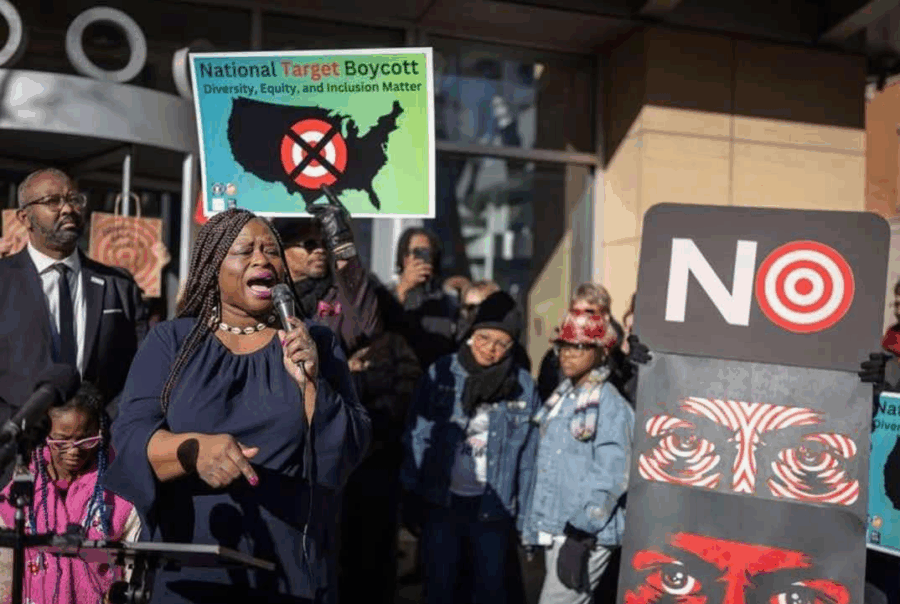In early 2025, several major U.S. corporations—including Target, Meta, McDonald’s, Walmart, and Amazon—scaled back or eliminated their diversity, equity, and inclusion (DEI) initiatives. These decisions, influenced by shifting legal and political landscapes under the Trump administration, have sparked significant public backlash and financial consequences.
Target Faces Significant Financial Impact
Target’s decision to phase out DEI programs—including those supporting Black employee advancement and Black-owned businesses—has drawn sharp criticism and fueled consumer boycotts. In February 2025, the first full month of boycotts, Target’s foot traffic declined by 9.5%, according to Placer.ai. By the end of the month, the company’s stock price had dropped from $142 to $94 per share, erasing approximately $12.4 billion in market value.
Target also reported an 11% decrease in foot traffic and a 3.1% year-over-year revenue drop in Q1 2025, resulting in a $24.5 billion loss. The company is now facing a class-action lawsuit from the City of Riviera Beach Police Pension Fund, which alleges Target misled investors about its DEI commitments.
Meta’s DEI Rollback and Mixed Financial Signals
Meta dismantled its DEI programs in early 2025, citing changes in the legal and policy landscape. It eliminated its supplier diversity program and scrubbed DEI-related content from public-facing materials. While Meta reported a 13.6% revenue increase in Q1 2025, its share price fell 35% from its February peak, signaling investor unease amid broader economic headwinds.
Amazon’s DEI Retrenchment and Employee Pushback
Amazon has significantly scaled back its DEI commitments, removing diversity references from annual reports and winding down targeted equity programs. The company cited a pivot toward “programs with proven outcomes” and broader cost-cutting efforts. But the move triggered internal friction, with employees raising concerns about Amazon’s long-term inclusivity. Petitions have circulated internally, urging leadership to reconsider the rollback.
Despite employee unrest, Amazon saw a modest sales boost during the initial boycott period. Momentum Commerce reported a 1% sales increase on February 28, the day of the first economic blackout, and a 5.9% jump during the March 7–14 boycott period.
Walmart’s DEI Rollback and Financial Performance
Walmart announced a reduction in its DEI initiatives, including ending racial equity training, ceasing consideration of race and gender in supplier contracts, and shutting down its $100 million Center for Racial Equity. The move, influenced by conservative pressure, drew backlash from Democratic officials and shareholders. A coalition of over 30 shareholders—representing more than $266 billion in assets—sent a letter to CEO Doug McMillon, voicing concern over the rollback’s potential long-term consequences.
Still, Walmart reported strong numbers: a 4.6% increase in Q1 FY25 net sales, totaling $108.7 billion, and a 7% gain in operating income, reaching $5.3 billion. The company attributed the growth to competitive rollbacks, robust seasonal sales, and increased spending by higher-income households.
Broader Economic and Consumer Trends
The rollback of DEI initiatives has sparked nationwide economic protests. On February 28, The People’s Union USA launched a national “economic blackout,” urging consumers to halt all purchases for one day. While analysts deemed the immediate impact inconclusive, the action underscored rising consumer activism.
A Harris Poll found that 40% of Americans have changed their spending habits to align with personal values, and 24% say they’ve stopped shopping at favorite stores due to political issues. This behavior is most common among younger, Black, and Democratic consumers—indicating a growing divide over corporate responsibility in DEI.
Conclusion
The corporate retreat from DEI has triggered lawsuits, consumer backlash, and market volatility. As companies grapple with compliance in a changing political environment, they also face increasing pressure to uphold inclusive values. The long-term economic and cultural costs of these decisions remain to be seen.
Join the Conversation
What are your thoughts on companies rolling back their DEI initiatives? Share your views in the comments.
Follow MEFeater on Twitter, Instagram, Facebook, and Pinterest for the latest updates on business, equity, and culture.
